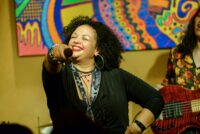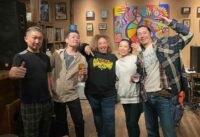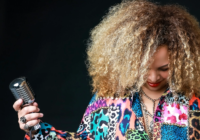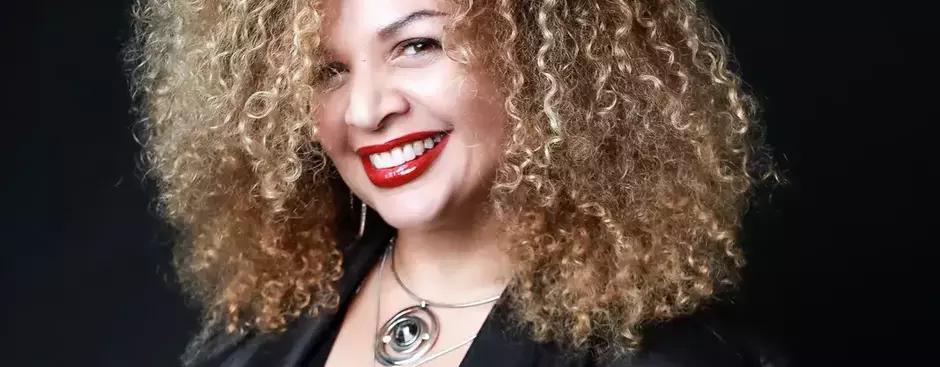From Philly to Japan, rock to pop to blues, originals to covers, Davina's done it all. Check out our interview with Davina to learn more about this international sensation.
This one is exciting! I at first had a very ignorant 'ugly American' attitude upon first coming across Davina Robinson's album Bluesaholic and videos of her shows around Japan. I mean, how much quality blues would you expect to find in the Far East? Well, it took me about 10 seconds into listening and watching before I got schooled. Blues is alive and well in Japan, particularly in Osaka, and Robinson has found a musical home right in the middle of it all.
Follow Davina Robinson on Spotify!
Coyote Music: First, thanks for taking the time to visit and share some of what you're up to in Osaka. I'm really psyched that we crossed paths--your voice and performing persona are an impressive 1-2 punch!
Let's get right to it: your "origin story." When and how did you get started in music, and who are some of your personal influences (genre agnostic)?
Davina Robinson: I started doing music around 1995, (when I was already living in Japan). That was my first band. I was teaching at a music school and became friends with some other teachers, one thing led to another and we started playing together. We were a bar band, so we played different genres, but we mostly did old-school soul and blues.
My biggest influences are Etta James, Tina Turner, and Aretha Franklin. But also Donna Summer, Pat Benatar, Chaka Khan, Robert Plant… "Genre agnostic" is a fantastic term. I’m stealing it.
CM: What may be on the minds of people just now discovering Davina Robinson is: what originally took you to Osaka? And you've been there for quite some time...what has it been about the city that's kept you there?
DR: I came to Japan to learn the language. After a couple of years, I was planning to return to the US and work in international/cultural exchange. But after those couple of years, I wasn’t ready to return to the US, and one year led to another. I just enjoyed my life here. Then I got married and decided to settle down here.
Osaka is a vibrant city with a colorful personality. It’s fun, it’s relaxed, it’s down-to-earth. It’s also easy to live and get around, and easier to make friends (compared to where I’d lived before). So, these qualities made it easy for me to want to stay.

CM: I watched "Osaka Blues City," the video linked from your website, and learned a lot about the culture and history of the city. Did you know about the comparatively blue-collar nature of Osaka and the presence of a lively blues underground? It really seems to have a similar vibe to what I've read about Liverpool, England leading up to the formation of The Beatles.
DR: I knew about the blue-collar nature of Osaka before I came here. But in my early years living here, I didn’t realize how much of a “blues city” Osaka was until the documentary. It was really enlightening, and it also affirmed to me that I was in the place I needed to be.
Also, in these last 30 years, Osaka has changed soooo much. The Osaka in the movie “Black Rain” is not the same city. But the blue collar roots and personality are still there.
CM: Musically speaking, you've got a pretty rockin' track out there under the moniker Black Rock Warrior Queen called "Osaka Boys." But with your Bluesaholic release you get back to a more traditional Blues sound. Can you talk a bit about your influences and how it's led to what you're writing and performing today?
DR: For those particular songs on my first two albums, I heard a rock sound in my head. So I wanted to honor that. It wasn’t a stretch because growing up, I listened to lots of stuff, including classic rock and the more blues-influenced rock artists like Jimi Hendrix, Janis Joplin, Led Zeppelin. But I wasn’t trying to become a “rock artist” per se.
I also had blues songs I’d written, but I put them aside for a future project. Two of those songs finally got recorded years later on the Bluesaholic release. (“Like a Woman” and “Big Butt Woman”.) It was a question of finding the right collborators.

CM: How long have you been performing in and around Osaka? Have you done much touring?
DR: I’ve been performing in the Osaka/Kansai area for 30 years. I’ve done bar bands, I’ve done exclusively original music, I’ve done a lot of acoustic duos, with just a guitarist. Currently, I have a couple of regular bands and a regular trio (piano/guitar/vocal). My regular venues are in Osaka and Kyoto.
A couple of times a year I perform in Tokyo. I’ve also performed in Kobe, Yokohama, Nagoya and others. And plans are in the works to perform in Fukuoka. These are mostly one-offs and mini-tours that I want to expand as much as I can.
In the US, I did a very DIY indies acoustic tour of the L.A. area to support my first release. It wasn’t very successful, but I got to meet some great people who were very supportive.
CM: Speaking of touring, in a previous exchange you mentioned wanting to get out more, perhaps touring across eastern Asia. Talk about what you're wanting to accomplish as a performing artist over the next few years.
DR: I want to release a full-length album in the next year or so. I’ve been writing some new songs, and I’d also like to do new arrangements of a few old releases. Some of those old releases are fun and lyrically/melodically interesting, so I want to give them another shot and update the arrangements.
Regarding touring, I’m hoping to perform in the US or Europe late this year or next year, but we’ll see. Asia is great, too. Any city that appreciates blues music! All this of course is dependent on timing and money. I still have a day job! lol But Those are my biggest goals.
CM: Do you get back to the U.S. or back home to Philadelphia much? And have you performed in the United States recently (or have plans to in the future)?
DR: My last trip to the US was to Honolulu in 2019 before the pandemic. And I did perform there; it was a one-off acoustic gig. It was a lot of fun.
But the last time I was in Philadelphia was in 2014, and that was the year my mother died. My absence from Philly has been for purely emotional reasons. And the pandemic extended my absence. Because I do miss it. Now that things are basically back to normal, the short-term goal is to promote my music in preparation for performances in the US (or Europe/Asia).
CM: Watching your YouTube videos, you seem to have a fairly regular group of musicians you perform with. What's the music community like around Osaka? Are there more set-lineup bands, or is there more of a free-flowing musical community where musicians are sitting in with each others' sets regularly?
DR: I always prefer working with the same people, rather than switching it up. Over the years, I’ve gone through several “sets” of musicians. Right now I have two regular bands, and the members of each of those bands play with each other in separate bands and so on… Lots of inbreeding. lol. So we know each other well, we know each other’s style really well. And having that trust and support on stage is very important to me. This is why I prefer working with the same people. And I think this is pretty indicative of the music scene here. I think there are more set-lineup bands, and sometimes friends of those bands will play as a guest or fill in for someone.
I like to check out other bands, just to see what people are up to, also to support my friends. And sing a song or two. ;) Also, I think this is where Japanese and American music cultures differ - I will check out a band I don’t know (and pay the music charge). But Japanese seem to only go to shows where they know someone in the band. Maybe it’s more economical that way. lol. It falls in line with the cultural trait of Japanese people preferring to have a connection/mediary, rather than being direct and “cold-calling” if you will.

CM: Are you looking to record soon? And are you writing regularly, or do you tend to play sets that are a blend of originals and covers?
DR: I started writing again, and I hope I can record a full-length (or what is considered a “full-length” - 6 songs?) later this year or early next year.
I’ve been doing sets that are a blend of originals and covers for a while. (I’ve done all-original shows and all-covers shows.) In my case, I think the audience probably prefers it that way, especially since I’m singing original songs in English, and they may not understand what I’m singing about. I don’t mind doing covers, but of course, the ultimate goal is to perform my own songs.
CM: Do you have some things you'd like to share with someone who may be running across you and your music for the first time? Or anything else to add at all?
DR: To those discovering me and my music for the first time, welcome to my musical hybrid of blues, rock and soul! It’s all about the power of emotion for me, and I hope that emotion resonates with you, whether through my lyrics or in my live performances. I feel like I’ve lived many lives throughout my music career as an American singer in Japan, and I hope you’ll join me on this next chapter!
CM: So if you've made it this far do yourself (and Davina) a favor and give her a follow on Spotify. If Spotify isn't your thing then check out one or more of the other platforms she's on:

